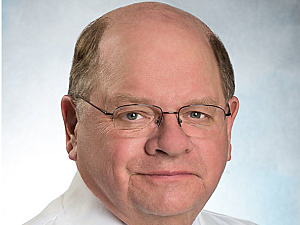Senior surgeons in the United States have been challenged to find meaningful ways to contribute to the field after they stop operating. Many turn to consulting, become medicolegal experts, or review cases for insurance companies. Others take a different path.
After more than four decades as a practicing surgeon, including 31 years as Chief of Surgery at Brigham and Women’s Faulkner Hospital, Pardon R. Kenney, MD, MS, of the Division of General and Gastrointestinal Surgery, was ready to step away from the operating room. But he wasn’t ready to depart from medicine or his love of teaching.
Today, Dr. Kenney has a new role in the Brigham’s newly formed Section of Surgical Educators of the Department of Surgery. This position allows him to share the knowledge and insights he has amassed with new generations of physicians. With two other senior GI surgeons at the Brigham, Scott Alan Shikora, MD, and David C. Brooks, MD, Dr. Kenney continues to act as medicine’s version of a force multiplier, impacting medical students, residents, attending physicians, and the patients they care for.
“I committed my entire career to working in academic medical centers where teaching is at the heart of both the organizational and my professional mission,” he says. “I find it gratifying to know that I’ve had a hand in educating students and residents who have gone on to do some great things—far more than I ever could have done myself.”
A Triple Role as Teacher, Coach, and Advisor
Dr. Kenney refers to his new role as a “jack of all trades.” As a teacher, he educates residents on surgical techniques, with a special focus on less common procedures and the traditional, open surgeries that have become rarer in the age of laparoscopic and robotic surgery.
“Today’s surgeons are well-trained in minimally invasive surgery for gastrointestinal conditions,” he says. “However, they still need to know the equivalent open surgical techniques to use when needed.”
Dr. Kenney’s teaching duties extend to conducting professor rounds with students from Harvard Medical School, where he applies an interactive Socratic approach to student case presentations and resulting discussions.
As an advisor, Dr. Kenney acts as a sounding board to help residents determine the next steps in their career after completing general surgical training. “Helping young professionals get oriented to what they want to do is something I’ve always enjoyed,” he says.
He also acts as a surgical coach to residents and attending physicians. This involves reviewing surgical cases and being present in the operating room during surgeries (but usually not scrubbing in) to offer advice and help surgeons be more acutely aware of habits they may need to adjust.
Getting a Charge Out of Teaching
Dr. Kenney has enthusiastically encouraged other senior surgeons to consider taking the same path he has. “When you’re ready to stop seeing patients,” he says, “but you’re not ready to stop being a physician, you can stay involved and continue to get professional fulfillment by passing on your decades of accumulated knowledge and experience to the next generation. They’re hungry for it.”
